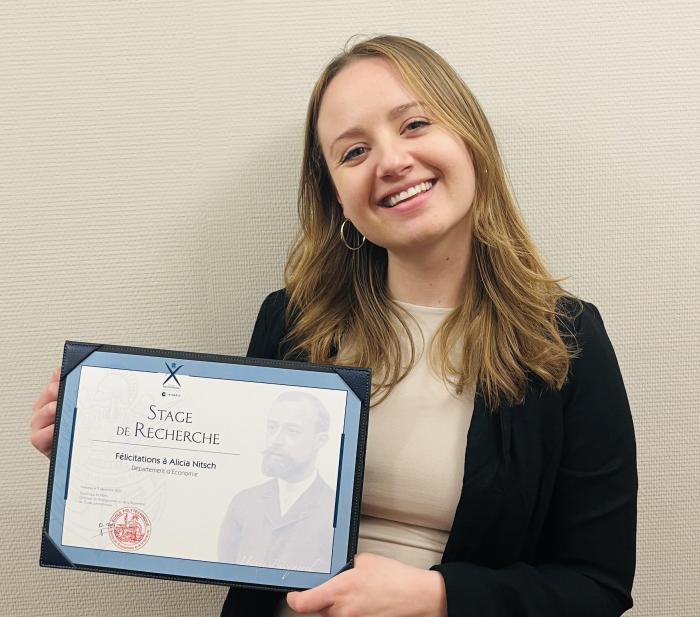Alicia Nitsch is a second year MSc&T student at École polytechnique in the Economics for Smart Cities and Climate Policy program and a Professional Engineer with a focus in transportation. She just received the Congratulations Award from the department of economics for having an excellent internship and internship report in HSBC Asset Management on “Net-Zero Portfolio Construction”.
Ban Zheng - the Head of Data Sciences in the Quantitative Equity Team of HSBC Asset Management, and Lise Renelleau – the Head of Thematic Products in the Quantitative Equity Team of HSBC Asset Management, were Alicia’s mentors during her internship.
In this interview, Alicia and her mentors talk about the internship, the ESCLiP Program and give you some precious advice.

Alicia - What is your educational background?
I have a Bachelor of Science in Civil Engineering from Northeastern University in Boston. After graduating, I worked as a civil and utility engineer for 5 years on infrastructure design and construction projects including roads, bridges, sites, master planning, and transit.
Why did you choose to continue your studies at École Polytechnique?
I was motivated to pursue a new challenge and transition into the economic planning of sustainable projects. I was inspired by a light-rail transit project I worked on because of the positive community impact plus the environmental benefit with the reduction of cars. I also love Paris so thought it would be a fun and different experience for my master's studies! So, when I found this program, it was really just a perfect fit with the combination of engineering, economics, and climate policy.
Tell us about your internships within this program
For my M1 internship, I worked at HSBC Asset Management in the Quantitative Equity team, together with Sustainable Investing group, on the research for net-zero portfolio construction.
I researched and analyzed climate databases, net-zero portfolio construction methods, climate scenarios, and climate metrics (e.g. temperature ratings, emissions, and emissions intensity) to determine how to best use the data to construct net-zero portfolios with a real economy emission reduction.
For example, investing in companies with targets and strong company governance in comparison to divesting from high-emitting sectors and investing in low-emitting sectors.
Ban - Have you ever had the opportunity to work with MSC&T students from École Polytechnique before?
I have a very close link with École polytechnique. First, I am a former student of the X2005 class and have also been a lecturer in the department of Economics of l’X since 2017, which means that I have the opportunity to teach and work with MSC&T students.
Ban - Why did you choose a student from the MSc&T ESCLiP for this internship?
École polytechnique has a reputation for training versatile engineers and researchers with a solid scientific base and great cultural openness. Professor Patricia Crifo strongly recommended Alicia for her academic excellence and her international profile – a very appreciated skill at HSBC.
Alicia- You won a prize for your thesis, could you tell us more about it?
I was one of the students who received the “Félicitations” award from the department of economics for having an excellent internship and internship report.
2 other students from this MSc&T were awarded!
I am very proud and thankful that my advising professor recommended me for the award.
What are the skills that you were able to acquire during this internship?
I was able to learn more about finance and asset management, improve my data analysis skills using R and improve research and report writing skills.
I also learned a lot about climate metrics, climate scenarios and models, plus transition pathways climate value-at-risk as well as the methodologies behind these datasets. École polytechnique requires an internship to include a research and data analysis portion to it so this was a perfect opportunity!
If you had to describe your internship in 3 words, which ones would you choose?
I would say challenging, engaging and applied learning (also interesting and fun to work on!)
Lise, Ban – As mentors, what advice would you give to future interns?
Ban - Alicia's success is due to her autonomy, curiosity and open-mindedness. Future interns: cultivate curiosity, keep an open mind to new opportunities and be autonomous to conduct research.
Lise - It is important to understand the underlying data’s content and why they are developed to measure before considering quantitative applications or solutions. The most important question in our business is the famous "so what?".
Therefore, a thirst for understanding the business and the needs of the clients andof the industry that you work for, is what ultimately distinguishes interns in terms of excellence.
This is what makes the quantitativework relevant: Alicia was able to combine technical knowledge with an appetite for understanding the final objective, not hesitating to ask questions, which made her contribution very useful in a short period of time.
Alicia - What do you think of the MSc&T ESCLiP as a student?
It’s a unique combination of engineering, economics, and climate policy. For a person with an engineering background it’s been amazing to expand the skills and learn to approach problems and to think in different ways - specifically with the environmental and energy economics and econometrics classes.
One of my favorite things has been the Capstone Projects, similar to a thesis, where we complete research and data analysis on a specific topic for the entire year. My first year, I was able to do a project analyzing the impact of the Paris Respire policy on CO2 emissions and for my second year, I am working with the City of Paris to conduct a cost-benefit analysis of installing solar panels in Paris.
Also, the ESCLiP cohort is extremely fortunate to come from a variety of backgrounds, which allows us to learn from one another as well as from the program.
Alicia - What are your ambitions for the future?
I hope to work in climate policy analysis and development to contribute to the most effective policy instruments and strengthen international cooperation or in the private sector, helping companies transition to net-zero.
